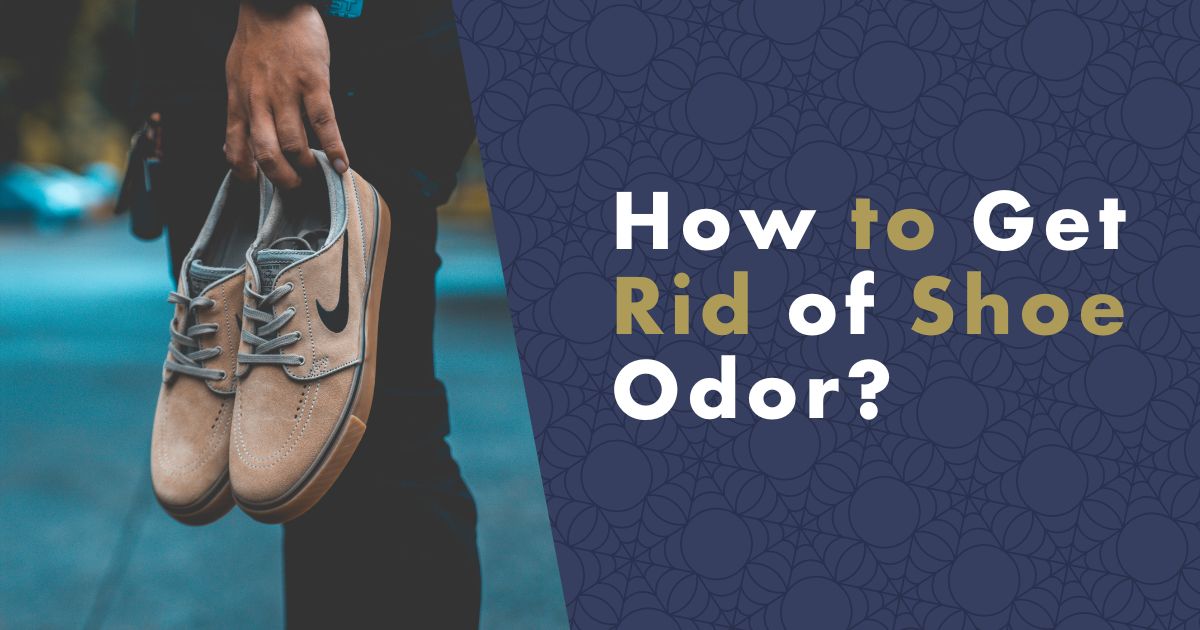An unpleasant odor from shoes is not only the domain of athletes and hardworking individuals. All it takes is to take a short walk in non-breathable footwear during hot summer weather – and the trouble begins. How to quickly get rid of shoe odor and why does it happen in the first place?

Causes of Shoe Odor
There can be several causes of unpleasant odor. It depends, among other things, on:
- the condition of your shoes, especially the insoles and individual layers of fabric,
- outdoor conditions – in warm, humid weather, various microorganisms are more likely to accumulate on the shoes,
- your physiology (excessive foot sweating is a risk factor).
In most cases, the smell of shoes is caused by waste substances produced by overgrown bacteria and fungi. However, it can also happen that these compounds are "picked up" by the shoes. Stepping into stagnant water or mud or soaking the footwear in the sea is enough.
How to Get Rid of Shoe Odor
One of the first solutions is washing the shoes. However, this is not a good idea for several reasons:
- soaking causes deformation of the footwear, and even after drying, it may not regain its original shape,
- the hot water can cause the sole to detach and wash away the colors,
- metal buckles and other parts of hiking boots are prone to corrosion and subsequent breakage (which is a problem you don't want to deal with on a challenging trek),
- Footwear can cause significant damage to a washing machine due to its centrifugal force (the drum spins at speeds of 1,400 rotations per minute or more).
There is also a health risk to consider. When washing shoes, there is a potential for the washing machine to be contaminated with bacteria, fungi, and other microorganisms. Given the ideal conditions of warmth and moisture, these microorganisms can quickly multiply and transfer onto clothing, causing it to develop an unpleasant odor. Typically, several washing cycles at 90°C are required to eliminate these harmful pathogens.
Article tip: How to remove toenail fungus (onychomycosis) without a prescription
So, What Can Be Done about Smelly Shoes?
First and foremost, allow your shoes to thoroughly dry out, preferably in a sunny location. By eliminating excess moisture, you can halt the further growth of bacteria and fungi. The remaining microorganisms can be taken care of by the sun's UV radiation.
You can significantly speed up the drying process by stuffing the inside of the shoes with newspaper. Never dry your shoes with a hairdryer or, worse, in an oven—excessive heat can irreversibly damage the shoe material.
An alternative is to use a shoe deodorant spray. It contains silver nanoparticles that actively eliminate bacteria and fungi. They work on a simple principle—silver atoms attach to the membranes and enzymes of microorganisms, preventing them from taking in food and reproducing. This leads to their rapid demise.
#produkty#https://www.nanospace.store/search/?string=menthol
Some essential oils and tannin, a compound found in black tea, also exhibit weaker antibacterial properties. To combat shoe odor, a proven remedy is to place several damp tea bags or grated citrus peel inside the footwear for at least 24 hours.
What about Insoles?
Insoles are a separate issue. If they are not damaged but still have an odor, wash them at a high temperature (at least 60 °C) and let them thoroughly dry. If they are damaged, replace them, as microorganisms tend to settle in cracks, making it almost impossible to remove them.
You can also consider using antibacterial insoles with silver nanoparticles. However, this brings us to prevention—how to prevent shoe odor in the first place.
#produkty#https://www.nanospace.store/search/?string=insoles
Prevention Is Key
The best way to solve shoe odor is to take measures that prevent its occurrence in the first place. Air out your footwear thoroughly after wearing, especially if you've spent a long time in them. If possible, change your shoes at work to avoid wearing them for extended periods.
If changing shoes is not possible, besides using the mentioned spray and insoles, wearing socks with silver fibers can also be helpful. Always wear socks with closed shoes to significantly reduce the transfer of bacteria and sweat into the shoe material (see the article on how to get rid of foot odor).
In challenging terrain, appropriate waterproofing can also be beneficial. It repels water, preventing microorganisms from reaching the shoe's surface. It is also suitable for shoes with water-repellent membranes, such as GoreTex, Sympatex, and others.
#produkty#https://www.nanospace.store/search/?string=socks+with+silver
Key Takeaways from the Article
- The main causes of shoe odor are overgrown bacteria and fungal infections. Risk factors include damaged footwear, warm and humid weather, and excessive foot perspiration.
- It is best not to wash shoes as they may get damaged or ruined in the washing machine. Always let them dry first, preferably in the sun.
- You can speed up the elimination of bacteria with the help of an antibacterial spray with silver nanoparticles.
- You can also prevent the proliferation of bacteria and fungi by using insoles and socks with silver nanofibers.
Sources
- Antibacterial activity of silver nanoparticle-coated fabric and leather against odor and skin infection-causing bacteria
- Silver in Health Care: Antimicrobial Effects and Safety in Use
- Antibacterial activity of silver-killed bacteria: the "zombies" effect

